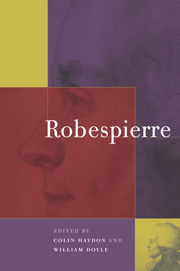Book contents
- Frontmatter
- Contents
- List of contributors
- Acknowledgements
- List of abbreviations
- Part I Introduction
- Part II Robespierre's outlook
- 3 Robespierre's political principles
- 4 Robespierre and revolutionary heroism
- 5 Robespierre and conspiracy theories
- 6 Robespierre and religion
- Part III Robespierre's politics
- Part IV Robespierre in retrospect
- Part V Conclusion
- Index
4 - Robespierre and revolutionary heroism
Published online by Cambridge University Press: 14 January 2010
- Frontmatter
- Contents
- List of contributors
- Acknowledgements
- List of abbreviations
- Part I Introduction
- Part II Robespierre's outlook
- 3 Robespierre's political principles
- 4 Robespierre and revolutionary heroism
- 5 Robespierre and conspiracy theories
- 6 Robespierre and religion
- Part III Robespierre's politics
- Part IV Robespierre in retrospect
- Part V Conclusion
- Index
Summary
I may choose either many years without glory, or a few days followed by long memories.
(Diderot (on Achilles))No revolution can ever occur without, in Danton's words, ‘this vast demolition of the existing order of things being harmful to somebody’. The reign of liberty, justice and virtue cannot come about without problems. The damage will be commensurate with the upheaval, and revolutionaries quickly become aware of the fact. Initially, absorbed in marking victory over the old order, they do not notice the scale of the dangers and the sacrifices that will be required of them, but as the clashes and troubles accumulate, and the number of victims mounts up, the revolutionary outlook changes from triumphalist pride to an attitude of heroic, patriotic sacrifice.
Alongside the cult of great men which the Revolution carried to extremes, it borrowed ideas from the Enlightenment more closely tied to the cult of the hero; because, for all its emphasis on genius, talent and merit, the Enlightenment had also retained a great admiration for heroism. Not aristocratic, warlike heroism, seeking personal glory, but the heroism of the courageous, just man, ‘the fruit of whose death’, as Diderot maintained, ‘will be his country's freedom, and the survival of all those for whom he lays down his life’. The spiritual strength of such a man, said Rousseau, lights up all minds, and lends energy and vigour to all virtues. A hero, for Rousseau, would show a burning love for the patrie and unconquerable firmness in adversity. Such civic and patriotic heroism, as typified by Socrates, would inspire the men of the Revolution repeatedly to assume the mantle of the heroes of antiquity.
- Type
- Chapter
- Information
- Robespierre , pp. 54 - 74Publisher: Cambridge University PressPrint publication year: 1999
- 1
- Cited by



